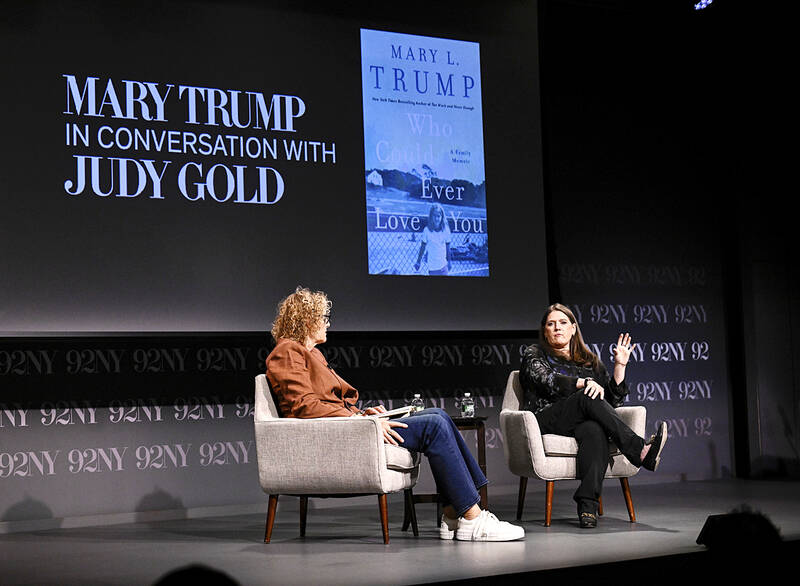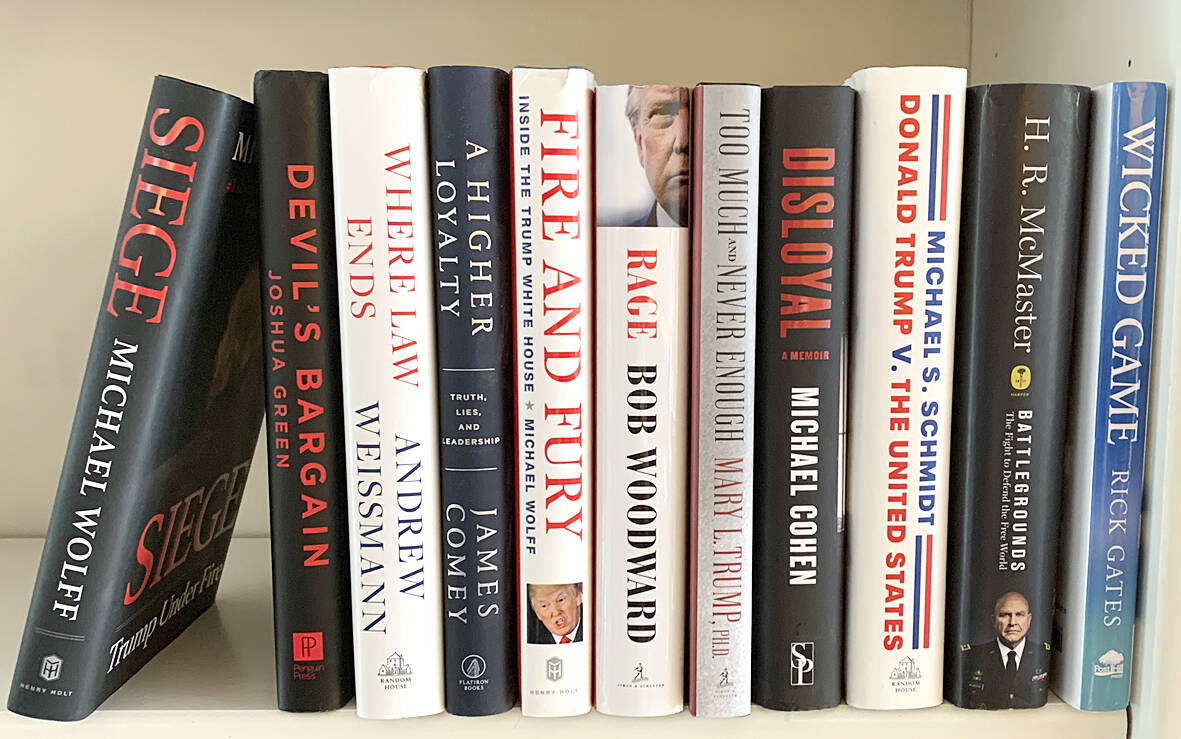As she anticipates her estranged uncle’s return to the White House, Mary Trump isn’t expecting any future book to catch on like such first-term tell-alls as Michael Wolff’s million-selling Fire and Fury or her own blockbuster, Too Much and Never Enough.
“What else is there to learn?” she says. “And for people who don’t know, the books have been written. It’s all really out in the open now.”
For publishers, Donald Trump’s presidential years were a time of extraordinary sales in political books, helped in part by Trump’s legal threats and angered tweets. According to Circana, which tracks around 85 percent of the hardcover and paperback market, the genre’s sales nearly doubled from 2015 to 2020, from around 5 million copies to around 10 million.

Photo: AP
Besides books by Wolff and Trump, other bestsellers included former FBI Director James Comey’s A Higher Loyalty, former national security adviser John Bolton’s The Room Where it Happened and Bob Woodward’s Fear. Meanwhile, sales for dystopian fiction also jumped, led by Margaret Atwood’s A Handmaid’s Tale, which was adapted into an award-winning Hulu series.
But interest has dropped back to 2015 levels since Trump left office, according to Circana, and publishers doubt it will again peak so highly. Readers not only showed little interest in books by or about President Joe Biden and his family — they even seemed less excited about Trump-related releases. Mary Trump’s Who Could Ever Love You and Woodward’s War were both popular this fall, but neither has matched the sales of their books written during the first Trump administration.
“We’ve been there many times, with all those books,” HarperCollins publisher Jonathan Burnham says of the various Trump tell-alls. He added that he still sees a market for at least some Trump books — perhaps analyzing the recent election — because “there’s a general, serious smart audience, not politically aligned in a hard way,” one that would welcome “an intelligent voice.”

Photo: AP
“It’s like the reboot of any hit TV show,” says Eric Nelson, publisher and vice president of Broadside Books, a conservative imprint of HarperCollins that’s released books by Jared Kushner, Florida Governor Ron DeSantis and Trump Cabinet nominees Pete Hegseth and Senator Marco Rubio. “You’re not hoping for ratings like last time, just better ratings than the boring show it’s replacing.”
In the days following Trump’s victory, The Handmaid’s Tale and George Orwell’s 1984 returned to bestseller lists, along with more contemporary works such as Timothy Snyder’s On Tyranny, a 2017 bestseller that expanded upon a Facebook post Snyder wrote soon after Trump defeated Hillary Clinton. Books appealing to pro-Trump readers also surged, including those written by Cabinet picks — Robert F Kennedy Jr’s The Real Anthony Fauci and Hegseth’s The War on Warriors — and Vice President-elect JD Vance’s Hillbilly Elegy, his 2016 memoir that’s sold hundreds of thousands of copies since Trump selected him as his running mate.
First lady Melania Trump’s memoir, Melania, came out last month and has been high on Amazon.com bestseller lists for weeks, even as critics found it contained little newsworthy information. According to Circana, it has sold more than 200,000 copies, a figure that does not include books sold directly through her Web site.

Photo: AP
“The Melania book has done extraordinarily well, better than we thought,” says Barnes & Noble CEO James Daunt. “After election day, we sold everything we had of it.”
Conservative books have sold steadily over the years, and several publishers — most recently Hachette Book Group — have imprints dedicated to those readers. Publishers expect at least some critical books to reach bestseller lists — if only because of the tradition of the publishing market favoring the party out of power. But the nature of what those books would look like is uncertain. Perhaps a onetime insider will have a falling out with Trump and write a memoir, like Bolton or former Trump attorney Michael Cohen, or maybe some of his planned initiatives, whether mass deportation or the prosecution of his political foes, will lead to investigative works.
A new Fire and Fury is doubtful, with the originally only possible because Wolff enjoyed extraordinary access, spending months around Trump and his White House staff. Members of the president-elect’s current team have already issued a statement saying they have refused to speak with Wolff, calling the author a “known peddler of fake news who routinely concocts situations, conversations, and conclusions that never happened.”
A publicist for Wolff said he was declining comment.
Woodward, who interviewed Trump at length for the 2020 bestseller Rage, said that he had written so much about Trump and other presidents that he wasn’t sure what he’d take on next. He doesn’t rule out another Trump book, but that will depend in part on the president-elect, how “out of control he gets,” Woodward said, and how far he is able to go.
“He wants to be the imperial president, where he gets to decide everything and no one’s going to get in his way,” Woodward said. “He’s run into some brick walls in the past and there may be more brick walls. I don’t know what will happen. I’ll be watching and doing some reporting, but I’m still undecided.”

In the March 9 edition of the Taipei Times a piece by Ninon Godefroy ran with the headine “The quiet, gentle rhythm of Taiwan.” It started with the line “Taiwan is a small, humble place. There is no Eiffel Tower, no pyramids — no singular attraction that draws the world’s attention.” I laughed out loud at that. This was out of no disrespect for the author or the piece, which made some interesting analogies and good points about how both Din Tai Fung’s and Taiwan Semiconductor Manufacturing Co’s (TSMC, 台積電) meticulous attention to detail and quality are not quite up to

April 21 to April 27 Hsieh Er’s (謝娥) political fortunes were rising fast after she got out of jail and joined the Chinese Nationalist Party (KMT) in December 1945. Not only did she hold key positions in various committees, she was elected the only woman on the Taipei City Council and headed to Nanjing in 1946 as the sole Taiwanese female representative to the National Constituent Assembly. With the support of first lady Soong May-ling (宋美齡), she started the Taipei Women’s Association and Taiwan Provincial Women’s Association, where she

Chinese Nationalist Party (KMT) Chairman Eric Chu (朱立倫) hatched a bold plan to charge forward and seize the initiative when he held a protest in front of the Taipei City Prosecutors’ Office. Though risky, because illegal, its success would help tackle at least six problems facing both himself and the KMT. What he did not see coming was Taipei Mayor Chiang Wan-an (將萬安) tripping him up out of the gate. In spite of Chu being the most consequential and successful KMT chairman since the early 2010s — arguably saving the party from financial ruin and restoring its electoral viability —

It is one of the more remarkable facts of Taiwan history that it was never occupied or claimed by any of the numerous kingdoms of southern China — Han or otherwise — that lay just across the water from it. None of their brilliant ministers ever discovered that Taiwan was a “core interest” of the state whose annexation was “inevitable.” As Paul Kua notes in an excellent monograph laying out how the Portuguese gave Taiwan the name “Formosa,” the first Europeans to express an interest in occupying Taiwan were the Spanish. Tonio Andrade in his seminal work, How Taiwan Became Chinese,